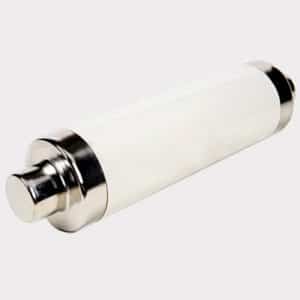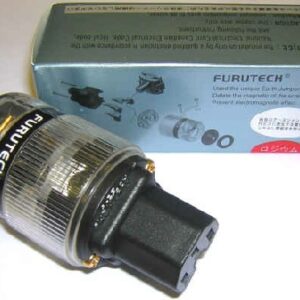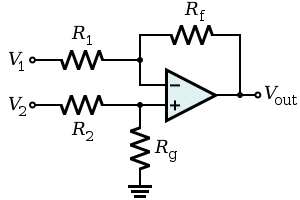Paul McGowan / PS AUDIO When we need to switch inputs on an analog preamplifier we use a switch. The kind of switch we use affects sound quality. For years we had only mechanical switches from which to choose. Standard switch contacts in those days were nickel or tin-plated while the more expensive and better-sounding […]
AUDIO: DIY / Technical
Found 173 results
Dear Colin, I’ve just picked up a Quad 405 ready for service. When I serviced my previous 405 I used the Dada kit which came with the necessary wire. Can you tell me please what size / gauge wire I should use to replace the existing power wires? Would this be suitable? http://www.rapidonline.com/design-te…0m-reels-62317 or could […]
3D printing is a growing field invading all of engineering. How has it affected the audio industry? Paul shares with us his thoughts and the few examples of specially manufactured tonearms and other high-end products venturing into this high tech field. Watch Now
Yesterday I turned on my Halo JC-1s for a little listening. As I walked over to drop a CD in the drawer I smelled a slight burning odor. When I looked back the lights were out on one amp. A check of the line fuse verified it had blown. Since the Owner’s Guide did not […]
For those of you scratching your head, a shorting plug is an RCA connector with its signal and ground wires shorted together. Here’s a picture of some fancy gold-plated versions. The idea is to stuff these shorting plugs into the unused inputs on a preamplifier. The goal is to make sure no noise gets into […]
OBJECTIVE Today folks, I want to shed some light on some of the mysteries regarding the mains supply into your equipment. I’m not, at the stage, going to be talking about mains regeneration as that’s the subject of another article, probably in March I want to 1.confound ignorance 2.help the buyer gain control of the […]
Paul McGowan / PS AUDIO Jitter, also known as timing deviation, is the variation in the time interval between two consecutive digital audio samples. This timing deviation can cause easily heard distortion in high-end audio systems including a loss of clarity, definition, and detail in the music, as well as a smearing of transients. Jitter […]
We all love our vinyl but let us not forget its many flaws. In particular, inner groove distortion. When vinyl spins the stylus follows in a spiral pattern. That spiral brings us ever closer to the center of the record where there is less and less room for modulation (think of the difference between the […]
Paul McGowan / PS AUDIO: I promised in yesterday’s post, The Art of HiFi, that I would continue part of the story of this recording’s creation. Couple of things first: I apologize for the slow website yesterday. Between the release of Copper Magazine and my post, the site bogged down to an interminable crawl that is […]
Paul McGowan … If you’ve done your system setup homework your chair sits at a comfortable distance from the loudspeakers. With the precision of a ruler, you’ve tweaked and adjusted the speaker’s position for best imaging. Though we call it the sweet spot, it’s certainly not the perfect spot. Within the boundaries of most rooms, the perfect […]
Dear Colin, The Art of Electronics (Horowitz & Hill) 3rd ed… … as DIYers probably already know is now out, only 25 years after the 2nd ed. My copy arrived today. I’m not trained in electronics and make no claim to more than a passing knowledge, but have enjoyed these authors’ style of presentation since […]
50 years ago in the dark ages of my past, I was determined to learn how circuits worked and what made amplifiers tick. Working full time as a disc jockey for the US Army in Germany at that time I had no practical means of attending school. Enter Herr Rudy Stroebel, chief engineer of the […]
PAUL MCGOWAN … For those with a clear understanding, this is a good post to skip. For those still unclear about what it means when we speak of high and low impedances, this might be right up your alley. The simplest way to think about impedance is to consider it an opposer. The higher the impedance […]
I wince when people equate op-amps with chips. An op-amp describes a topology, not a chip. Yes, the op-amp topology is often built onto a silicon wafer, but we should be careful not to forever bind the two together unless we’re clear about the difference. (If you’re technically minded there’s a great paper describing in […]
I’m all for blowing my money on hifi but I’m curious about how big a difference main conditioner make to your system, I use a cheap one myself and noticed a nice improvement in sound quality but are the more expensive ones worth it? Dip in and out HERE
It’s more than just camaraderie. To non-engineering folk, our conversations might sound like a different language what with all the terminology bandied about. But more than terminology is the implied understanding of bigger concepts. Terms like -3dB, half power, slew rate, open loop, rise times, wave shapes, carry with them major implications. If our depth […]
Dear Colin, I recently saw a 240v integrated amp from the UK and was wondering if it is ok to use with a Step Down Converter? What are the pros and cons of using a step down device? Does it affect the sound and am I in jeopardy of blowing the transformer or ruining […]
PAUL McGOWAN / PS AUDIO Conventional wisdom would have us believe best results are obtained via simple solutions. The simpler the solution the better and cleaner the outcome. I find simple solutions are often the most difficult to accept and inevitably the hardest to find. How many times have you gone round and round in […]
Amplifier companies advertize ultra wide bandwidth power amplifiers but what does that term mean and how does it relate to sound quality? Watch Now
Hi Colin. Just had a crackle in a left channel (nothing you’ve built by the way), fade to nothing, then that stench of death. Took the lid off my Crimson mono (a simple oblong) and all looks healthy in fact like new, the only thing that’s gone is the fuse. Could it be a mains […]
PAUL McGOWAN Funny thing is, there’s really no good answer any more. I used to advocate RPG diffusors and personally I use a combination of RPG and DAAD Diffusors but it seems RPG has gone away from high-end accessibility and DAAD is not something you can afford. Where does one go now and what the […]
I have tried six different fuses, including some that were claimed to not be directional. I have long used the IsoClean fuses as the best I have heard. No longer! I just got two 10 amp slow-blows WiFi Tuning Supreme fuses that really cost too much but do make a major difference in […]
Often times electricians and hifi dealers recommend the use of isolation transformers to reduce the effects of line noise in recording studios and high-end audio systems. Paul shares his opinion on their use and explains why he’s against them. Watch Now
I just purchased a pair of Raysonic monoblocks without knowing they were 220V and then I bought a pair of AR1500W Voltage Converter Stabilizers. One was clicking real bad and I had to unplug it. The other one clicks a few times at random every hour. I am trying to return them but I am […]











